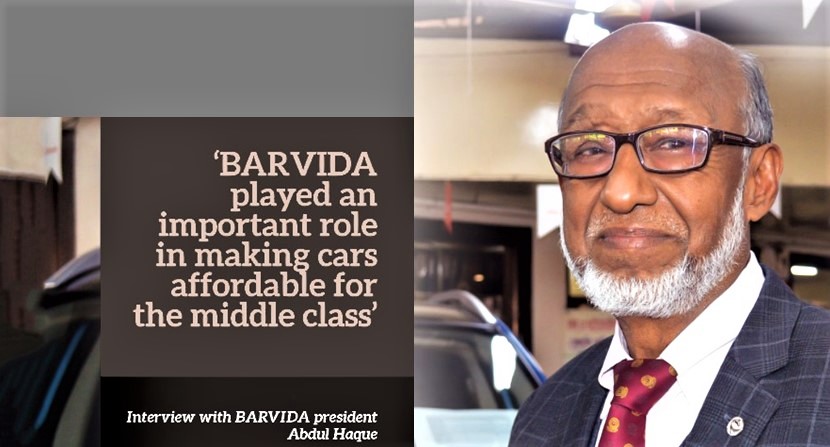Interview with BARVIDA president Abdul Haque

The owner of renowned automobile dealer Haque’s Bay and the founding president of Bangladesh Reconditioned Vehicles Importers and Dealers Association (BARVIDA) recently spoke to Fintech. Here is an edited excerpt of the interview.
Talk a little bit about how you came into this business.
I had a tough childhood. I lost my father when I was a kid. So, my family struggled a lot. I had the typical struggle someone from a low-income family losing their father so early would have. This taught me a lot.
I began working at a very young age. I am originally from Comilla but I moved to Chittagong for work. Luckily for me, I was able to get a job at a German pharmaceutical company around 1967. I began studying while at the job, and in 1971 I joined the liberation war. I got back to the job after the war, but eventually had to leave because of dispute with the union workers. I had decided then I would never work a job.
In 1974 I started working as a supplier for the Progoti Industry. That was my beginning in business. There I grew an interest in cars. So, started a car dealership. Around 1977/78 cars were imported under wage earners schemes. I started importing then. I also began to supply to the government. In the 80s demands for cars started to increase in the private sector. But they didn’t have the budget to get new cars. So, we imported Toyota vans that were priced Tk40-50 thousand and sold those to them. This is basically how I began my business.
What kind of challenge you faced in paying taxes and duties?
The tax was very high then. We struggled a lot with that. At one point people at the customs advised us to form an association. We struggled a lot because of the existing policies and faced problems at the port.
The association ended up being formed around 1994 and that’s when BARVIDA was founded. We entered negotiations with the government and we formed a committee. We were able to persuade them and see the importance of private vehicles. And you can’t have private vehicle with such high duties and taxes. Mr Nasiruddin brought big changes in policy and non-luxury cars was waved from extra duties. That paved the way for middle class people to own cars.
We are grateful the customs officers that helped us. And of course gratitude is due to late finance minister Mr Saifur Rahman, Mr Kibria and Mr Muhith.
How many members do you now have?
Over 800. There are employees as well. We have branches in all parts of the country, with thousands of people working. Our members are regular tax payers. We are creating jobs and economic growth is happening through us.
Tell us about the kind of challenges you deal with.
One of the bigger challenges have been the disparity in tax rates between new and old cars. Reconditioned cars are dealt under what is called the customer value system. The new car dealers can declare the valuation and that is accepted. For us we have to pay 35% commission on what the Japanese government set as the price for old cars.
This is a challenge and harming our business. We need a big policy remake for this. Finance minister, commerce minister are also businessmen. They should step up and the government should help us with this.
Is there an opportunity for foreign direct investment in Bangladesh’s automobile industry?
It is possible, but it depends on market study, supply chain, demand and job opportunities. People interested in FDI want to stop reconditioned and create a monopoly. In that case the government will have to give up the revenue they now get from our business.
In many countries you see 35-40% being manufactured and rest are being imported. I think there should be proper market study by internationally qualified experts. After proper research you should go to formulate policy. It’s not going to be viable if the market is not big enough for hundreds of thousands of volumes.
What do you expect from the government?
We are grateful to our prime minister Sheikh Hasina. She stepped in when there was a plot to destroy our market. When I told her about the change of the procedure to 3 years, instead of 5, she immediately removed the commerce secretary.
We now request the government to take this forward and make the business sustainable.
Interview coordinated by Senior Staff Reporter Azaz Rahman








